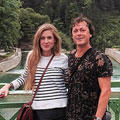Directors Caitrin Rogers and Kim Mordaunt with Film Forward in Bosnia & Herzegovina.
Kim Mordaunt, director, The Rocket
The first screening in a new country is always so full of the unknown for me. Ours was at the American Corner in Zenica (sponsored by the U.S. Embassy) and hosted by Sead Pasic. Sead, a music buff of all genres, breaks into song regularly–and has been bringing music and life into to the local library since the 1970s. Sead said he was worried that this teenage group would be too cool for a film with two protagonists under 10 years old set in little known Laos. But the reaction was full of emotion, enthusiasm and curiosity.
Sead opened the first question, which was based around the notion of “redemption”–redemption inside war and family became the focus. What people seemed most moved/inspired by was how the characters in The Rocket found some level of peace after so much conflict–to move forward, to break cycles of retaliation, which I think is also many people’s hope for Bosnia & Herzegovina. The students had a focused interest in the mysticism and folklore of The Rocket. They pointed out how the boy (Ahlo) who was thought to bring bad luck, had to bring “rain” in order to prove he was not the cause of loss of his mother, their home, and also the “water” which the multinational dam had taken away from them. I thought this observation of bringing the mythical, the personal, and political together was very sophisticated for a young audience so far from Laos. And I wondered if this maturity has come from Bosnia & Herzegovina surviving its own war history and having to rebuild itself spiritually and economically.
Our next screening took place whilst the city simultaneously held big celebrations for the opening of the City Hall–first time since the war (because of extreme damage) and at the same time a rally was also taking the streets that protested about the dysfunction of divisions of Bosnia and Herzegovina–in schools, in government etc. This second screening was at the Kriterion Art Cinema (a very vibrant independent arts hub) run by an inspiring group of young artists headed by their director Vanja Lazic. A young woman called Adina Kaljanac who was very moved by the film and “honesty of the children’s performances” began a discussion about young people’s voice in cinema in Bosnia. She acknowledged the war will always be apart of their history, of them, but felt there needed to be a new wave of stories, ones of hope, that were told in a different way–not necessarily by auteurs, but more of a communal voice that represented their new generation. I think this was hugely inspiring and Caroline Libresco of Sundance Institute reminded her that this was a big part of the Institute’s belief that stories should be a collaboration of creative voices, which The Rocket very much is. The Kriterion, also the home of Bela Tarr Film Factory, could be the place where this new communal voice finds its stage.
This is my first time in Bosnia & Herzegovina and I made the big mistake expecting it would feel more like an Eastern Bloc country. I quickly was corrected and told it was never part of the Eastern Bloc (it remained independent in times of great oppression). I was totally surprised seeing the skyline of minarets–the Ottoman history is everywhere around you but still with Synagogues and Churches active along side the Mosques’ prayer calls and church bells bouncing around the beautiful Sarajevo valley that so recently was under the longest military siege in war history. This is very inspiring and I really hope Sarajevo can find a way to not be divided, to continue to share this precious spiritual place in the Dinaric Alps.




